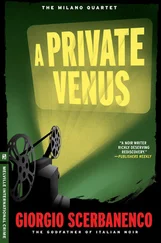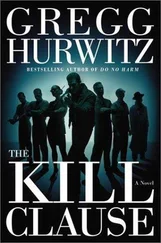Frank turned his head slowly from side to side while opening and closing his eyes at regular intervals and projecting the images of the room on to his mind like slides.
Click.
A detail.
Click.
Look for a detail.
Click.
What’s wrong? There’s something strange about this room.
Click.
Something tiny, something incongruous.
Click.
You know what it is. You saw it. You registered it.
Click, click, click…
The room appeared and disappeared as if lit by a flash. He went on opening and closing his eyes, hoping each time that whatever he was seeking might magically appear.
The wall on the left.
The shelves on top, full of recording and electronic equipment that Jean-Loup used to filter his voice and transform it into No One’s.
The two Tannoy speakers set up for the best possible stereo effect.
A sophisticated CD and mini-disc reader.
A mixer.
A cassette player and DAT machine.
A record player for old 33s.
The records set up on the lower shelf.
LPs on the left, CDs on the right.
In the centre, the surface that he used as a desk.
Atop another mixer, a Mac G4 computer that ran the sound equipment.
At the back, against the wall, a black device that looked like another small CD player.
The front wall.
Metal cabinet, set into the wall, empty.
The wall on the right.
The doors to the other rooms and in the middle a wooden table and a small halogen lamp.
Frank stopped suddenly.
Another small CD player.
He walked to the back of the room and carefully examined the black box. He wasn’t a stereo aficionado, but from what he knew, it looked like a fairly ordinary model made of black metal with a small display in front. It didn’t even look very new. There were wires coming out that went to a hole at the bottom of the shelf. There was a series of numbers on the bottom, written on the metal in white marker pen. Someone had tried sloppily to erase the numbers, but they were still legible.
1-10
2-7
3-4
4-8
He was puzzled. He pressed the EJECT button and the tray on the left of the display slid out soundlessly. There was a CD with writing on the gold surface, again in marker pen, this time in red.
Robert Fulton-‘Stolen Music’.
That damned record again. That music was following Frank like a curse. He stopped to think. It was natural that Jean-Loup would make himself a digital copy of the record, so that he could listen to it without ruining the original. Then why, when he killed Allen Yoshida, did he need to take the actual LP? There was certainly some symbolic meaning, but there could also be another reason…
Frank turned to look at the modern CD player next to the other components of the sound system and then turned again to the other, much more modest, piece of equipment. And he wondered: Why would someone with a CD player like that use a cheap thing like this?
There were many answers to that question, each one with some merit. But Frank knew that none of them was right. He leaned his hand on the black metal of the device and ran his fingers over the numbers written in white as if he expected them to be raised and palpable.
A theory is a journey that can last months, years, sometimes an entire lifetime. The intuition that ignites it runs through the brain at the speed of light, and its effect is immediate. One moment all is darkness and the next, everything is light.
Frank suddenly realized what that second player was for and what the numbers that someone had tried to erase from its surface meant. They were the numbers of a combination, presumably for a lock somewhere. But where? He pushed the tray back in and pressed the start button. A series of numbers appeared on the display, showing the track being played and the elapsed time since it had started.
He watched the seconds ticking over slowly on the small, illuminated rectangle. After ten seconds he pressed the button that moved from the first track to the next. Then, he waited until the number 7 appeared and went to the third track. When the display showed 4, he went to the fourth. And when he read the number 8, he pressed the stop button.
Click.
The click was so faint that Frank would not have heard it if he hadn’t been holding his breath. He turned in the direction of the sound and saw that the metal cabinet to his right had moved over a few inches. The two sides were so perfectly matched that they seemed to be part of the wall.
He stuck his finger into the crack and pulled. Sliding along two runners on either side, the metal cabinet came forward about a yard, revealing a round door behind it. In one corner of the metal door, there was a wheel that looked just like the one in the laundry room. When they had searched the bunker, they hadn’t asked themselves why this cabinet was completely empty. Now that he had an answer, Frank found the question that nobody had thought to ask. The cabinet was there to hide a second entrance.
Frank turned the wheel counterclockwise without any effort until he heard the lock click, then he pushed and the door opened, sliding soundlessly on its hinges. Jean-Loup Verdier must have spent a great deal of time on technical knowledge and maintenance. Behind the door was the opening of a round cement tunnel, about a yard and a half in diameter. It was a black hole that started from the shelter; where it ended, God only knew.
Frank slid his phone into his shirt pocket, removed his jacket, and pulled the Glock out of its holster on his belt. He knelt on the ground, wriggled past the rods holding up the metal shelves and crawled into the tunnel entrance. He halted a moment, staring at the tunnel and the darkness it promised. He could see no more than a yard in the dim light of the tunnel, partly obscured by the cabinet and his own body. It was probably dangerous, very dangerous, to squeeze blindly into that tunnel.
Then he remembered who had escaped through the tunnel and everything that person had done, and he decided to follow.
Pierrot peeped out from behind the bushes where he was hiding and looked on to the street, relieved to see that all the cars and people who were waiting had left, along with the policemen who had been stopping them. Good. Now it was good, but before he had been really afraid…
After leaving the radio station, he had walked up to Jean-Loup’s house, his knapsack on his back. He had been a little nervous because he wasn’t sure that he would be able to find the street, even though he had been to Beausoleil several times in Jean-Loup’s car, which was called a Mercedes. He hadn’t paid much attention to the route because he had been too busy laughing and looking at his friend’s face. He always laughed when he was with Jean-Loup. Well, not really always, because there was someone who had said that only fools laughed all the time and he didn’t want people to think he was a fool.
And anyway, he wasn’t used to going around by himself because his mother was afraid that something would happen to him or that people would make fun of him, like Mme Narbonne’s daughter, the one with the crooked teeth and pimples who called him ‘retard’. He didn’t know what a retard was and when he had asked his mother, she had turned her back to him, but not fast enough to keep him from noticing that her eyes were wet with tears. Pierrot had not been too worried about that. His mother’s eyes were often damp, like when she watched those movies on TV where there were two people kissing at the end with violin music and then they got married. The only thing he had really been worried about was that his mother’s damp eyes meant that sooner or later he would have to marry Mme Narbonne’s daughter.
Читать дальше










